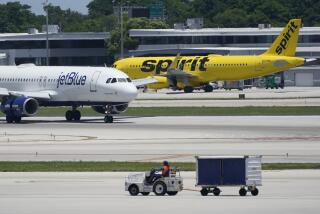Delta and Western Merger Sealed in Wee-Hours Ruling : Justice O’Connor Clears the Way, but Union Plans Appeal to Full U.S. Supreme Court
- Share via
NEW YORK — The merger of Western Airlines and Delta Air Lines was completed early Wednesday despite a union effort to thwart the transaction and only after post-midnight action by a U.S. Supreme Court justice.
At 2:15 a.m., Justice Sandra Day O’Connor vacated a lower court’s injunction that had blocked the merger, which was to have been completed at midnight Tuesday. However, the unions immediately said they would seek to have O’Connor’s order overturned today by the full Supreme Court.
As quickly as possible after O’Connor acted, Delta filed a certificate of merger in Chancery Court in Delaware, the state in which the Atlanta-based airline is incorporated. The papers were filed at 8:30 a.m.
“That ends the existence of Western Airlines,” a Delta spokesman said. “The company is now totally merged into Delta. We could not be happier.”
The completion of the merger between the two carriers was the final step in a process that began in September when Delta announced that it was paying nearly $900 million for Los Angeles-based Western, the nation’s oldest airline. Western had been operated as a wholly owned subsidiary of Delta since the government gave its approval in December.
On Tuesday night the last clues that Western had ever existed--the signs at ticket counters and the uniforms worn by employees and the names on aircraft--were to have been removed.
But, shortly after 5 p.m., the U.S. Court of Appeals for the 9th Circuit ruled in San Francisco that the companies must arbitrate a contract dispute with two of the unions representing Western employees. The court ordered the companies to submit the disagreement to arbitration and held up the merger until the arbitration process had ended.
Delta’s operations were thrown into confusion. Western workers were told, for example, that they should wear their old uniforms and report to their old Western work stations.
The dispute between Delta and the two unions was over whether the unions’ contracts with Western entitled them to represent the same workers after Delta and Western were combined. Delta has no unions except the Air Line Pilots Assn. and a small in-house organization of dispatchers.
Involved in the dispute are the Teamsters union, to which 2,200 of Western’s mechanics and related workers belong, and the independent Air Transport Employees, which is the bargaining agent for about 5,000 ticket and reservation agents. A spokesman for the Air Transport Employees said Wednesday that the union’s position is that it still represents its members at Western; the Teamsters could not be reached for comment.
Robert Bush, a Los Angeles attorney for the Air Transport Employees, said he will file papers with the Supreme Court today asking the full court to overturn O’Connor’s order.
Bush said O’Connor’s three-paragraph order was limited in nature and stayed only the portion of the appellate court’s order that blocked completion of the Delta-Western merger. “The O’Connor order does not stay the part of the 9th Circuit order that arbitration be compelled,” he said.
An arbitration hearing involving the Teamsters started Tuesday and one has been scheduled for April 6-7 for the Air Transport Employees. However, on Wednesday, Western representatives went to the second session of the Teamsters’ hearing and said they would not participate because Western no longer existed and because Delta has no duty to arbitrate, according to a source close to the Teamsters.
The hearings concern the validity of so-called successor clauses in the unions’ contracts with Western. The clauses stipulate that the contracts would continue in force in any merger or acquisition until union seniority lists are integrated with those of the surviving company. They were put into the contracts in return for Western employees making substantial pay and work rule concessions in recent years when the airline was beset with financial problems.
Ever since the merger was announced last September, Delta has taken the position that Western’s unions would no longer represent its employees after April 1. The unions disagreed and still do. All but 8% of Western’s hourly employees are represented by unions.
“It is our position that the arbitration should go forward,” Bush, the ATE’s attorney, said Wednesday. “Implicit in O’Connor’s order is that there is a way that Delta could be bound by an arbitration decision.”
But a Delta spokesman said the issue of arbitration following the merger is “moot.” He said it has always been Delta’s legal position, based on past court cases and the Railway Labor Act, “that in a merger of this type, the unions would not survive after the merger. . . . Arbitration is moot because contracts do not apply to the merged company.”
The unions and their lawyers have a very different interpretation of the act, which covers airlines and their employees.
Legal observers said lawyers for the airlines may file papers with the Supreme Court seeking a clarification of O’Connor’s terse order on the specific issue of whether the arbitration still must be held.
There have been a number of federal court cases in recent years in which successor clauses have been held valid. However, most of those cases involved companies operating under the jurisdiction of the National Labor Relations Act.
Robert E. Dallos reported from New York and Henry Weinstein from Los Angeles. Times staff writer Greg Johnson in San Diego also contributed.
More to Read
Inside the business of entertainment
The Wide Shot brings you news, analysis and insights on everything from streaming wars to production — and what it all means for the future.
You may occasionally receive promotional content from the Los Angeles Times.










